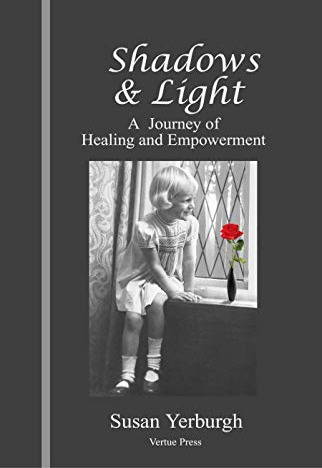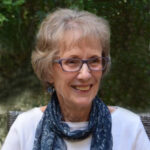Denis Ledoux: I had the pleasure of working with Susan Yerburgh for several years as she articulated her message in Shadows & Light: A Journey of Healing and Empowerment and used it to continue her own healing journey. Because of the significance of her writing and life experience, I am delighted she agreed to do the following interview (conducted in an email.)
Denis: Can you tell our readers—your fellow writers—what your book is about and why you were impelled to write it? What was driving you to spend the time, energy and money to get this book out into the world?
Susan: Shadows & Light: A Journey of Healing and Empowerment is about what had happened to me in the past and about my subsequent healing journey, the search for my identity which had been compromised by my life experience.
I underwent electroshock treatments in my early twenties and, a few years later, I realized some long-term memories had been erased. This loss contributed to problems in working through my identity. After years of somewhat unsuccessful traditional therapy, I turned to alternative healing and spiritual counseling. Fortunately, the afterlife and spirit guides came in to help me. Finally, I got the answers I needed and, after two divorces, I was able to create a loving relationship that has endured.
Writing a book was something I needed to do. I wanted to break my family code of silence, complete my healing process, and tell people what had happened to me. Also, I wanted to leave a legacy for my grandchildren and future generations. My perseverance helped bring it to fruition.

Susan: About four years before publication, I had the idea of a memoir and started writing down a few stories when I felt like it. After six months, I realized I needed help if I was ever going to write an actual book. At that time, I approached you and you started to coach me. I spent about three years actively writing. The last six months was spent more on rewriting and editing. I would not write when I went on a vacation because I felt I needed the break, but I would come back with a fresh outlook to resume writing. There was no quitting!
Denis: You must have had periods of time in which you were discouraged or at least less enthusiastic. Can you tell us about how you kept yourself going? What worked for you?
Susan: Since I am retired, I had plenty of time to write. I kept to a strict schedule writing for at least two hours every afternoon, five days a week. I gave myself weekends off but there were times that I did write on weekends. I looked at it as a job that I had to keep doing. I don’t think I could have done it without a writing coach.
Denis: Tell us what the theme of your book was. How did you come upon this theme? Do you feel you were successful in getting your theme across to the reader? Is there anything in particular you would say was the most difficult thing to succeed at in this book? Was it scheduling, research, plotting, point of view, believing in yourself, or what else?
Susan: What was the most difficult was the actual writing and remembering things from the past. Like all therapy, my journey of healing involved pain. Unfortunately, some of the past could not be researched or there were no living relatives who knew the answers I was looking for.
Denis: Was there a success trait you have discerned for the process of writing? That is, are there best practices you would recommend to your fellow writers that would facilitate completing her/his memoir?
Susan: I would say that people should start with writing the stories that they most want to write about. Those are the stories they remember most vividly and so these stories may be the easiest to get a memoir going.
Then I would say to stick to a schedule. Writing success is realized bit by bit, day by day. Without discipline, your memoir will not go any place.
Lastly, I would strongly advise writers to get help—coaching, editing, even ghostwriting—when they need it.
Denis: What makes for a successful memoir? Do you feel your memoir was a success?
Susan: When I first met you, I remembered you told me that a memoir was a hero’s journey. At the time I had no idea what he meant but now I do. I feel like my memoir is a success because when reading it, one can see my journey of healing: the transformation from the depressed, downtrodden young adult to the wiser, empowered older woman I am today.
Denis: How do you recommend people deal with sensitive material that relatives might take offense at? Your journey of healing did find fault after all.
Susan: Prepare them ahead of time. I knew my sister would have a problem with the way I portrayed our parents. Early on, I told her I was starting to write some stories for my family. Then I told her I thought I would turn it into a book. Before publication, I talked to her more about the content: how different our perceptions of growing up in the same family were and that she might not agree. Despite the preparation, she was angry at me. I still think it is a good idea to do the long-term preparation I did rather than “drop the bomb” at the last minute.
Denis: Did you envision yourself as a writer before you began this book? What is your identity as a writer now?
Susan: I never envisioned myself as a writer before writing the book. In fact, I never liked to write and struggled with expressive writing in school. Now having published a book, I can consider myself a writer but I still don’t feel like a genuine one.
Denis: Will you write another memoir?
Susan: No. I accomplished what I wanted to with this memoir and I do not feel the need to write more. My journey of healing has been completed.
Denis: Was selling copies important to you? If that was part of the memoir writer’s experience for you, what sort of outreach have you done to pursue sales: did you speak to groups, do guest blogging, do interviews, etc.?
Susan: Selling a lot of copies was never important to me. I was planning to give a talk at the local library and have a house party but then everything changed with Covid-19. Now that I have had plenty of time to think and have read up on marketing books, I might have done things differently. My memoir. as it turned out, is what I need to write. It is fine for my family, people who know me, and others interested in my story but is not written to sell many copies. At the time, I just wanted to get it published before Christmas 2019 to give as gifts. In hindsight, I wish I had spent more time thinking about launching and marketing the book.
This post is one of over 500 informative, well-written articles we have made available to you on this site.
We’ve contributed to your writing success; now we ask you to contribute to the expansion of the memoir conversation.
By reposting this article on your blog or website or reposting on your favorite social media, you will inform your fellow memoir writers of the programs and services—many for free like the blogs—that are available at TheMemoirNetwork.com.
Thanks for your generosity. You rock.


No comments yet.